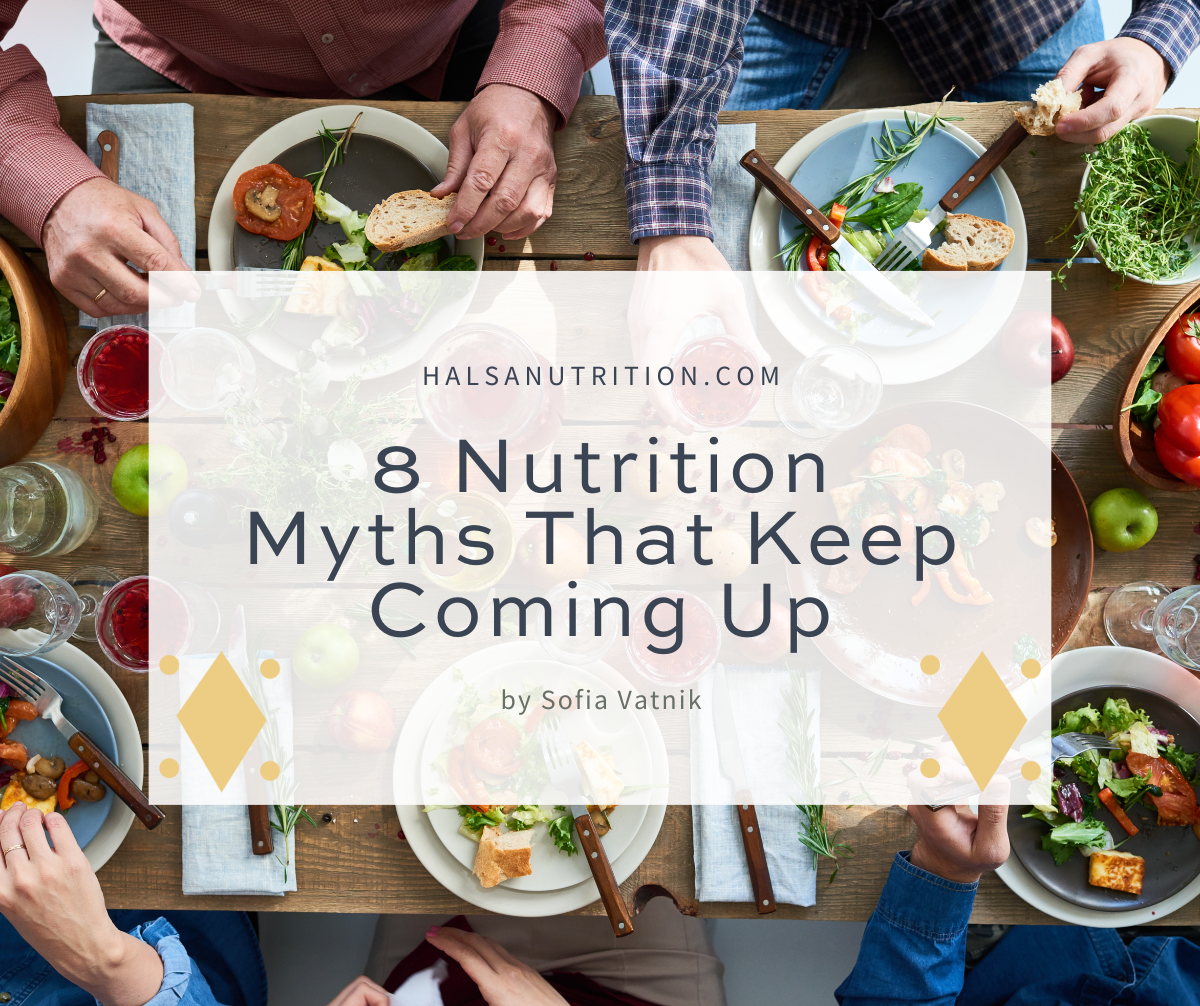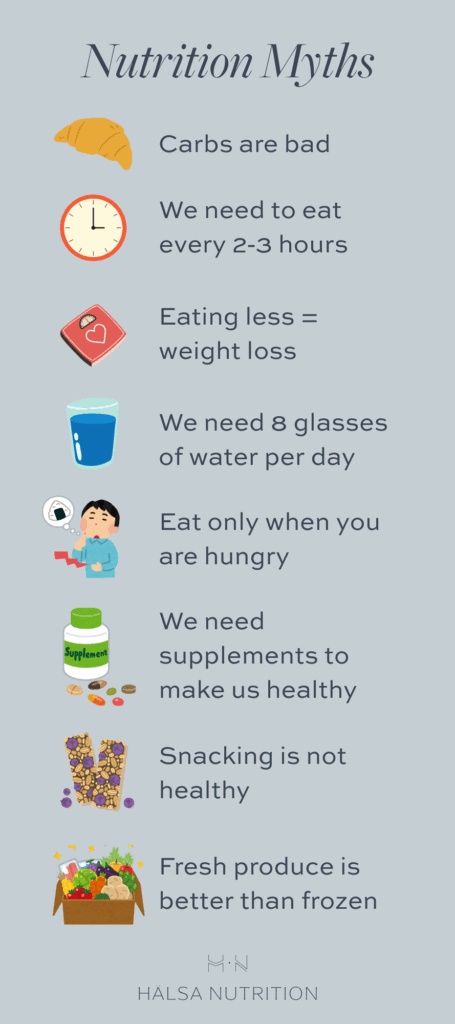
8 Nutrition Myths That Keep Coming Up
Estimated reading time: 5 minutes
by Sofia Vatnik
You may have heard popular nutrition myths such as carbs are bad, eating less will lead to weight loss, or only eat when you are hungry. In today’s age, we get nutrition knowledge from so many sources, and it can be overwhelming to sort through the information. We’ll break down some of the most common nutrition myths and share what’s really true so you can feel more confident and relaxed about the way you eat.
1. Carbs are bad
- Carbs contain glucose, which is the preferred energy source for the brain.
- Carbs are in everything, not just the typical breads and pastas; they are also in fruit, milk, yogurt, vegetables, and legumes.
2. You must eat every 2-3 hours
- While it is important not to go long stretches without eating, as this can lead to low blood sugar levels and dysregulated hunger and fullness hormones, it’s important to listen to your own body’s natural fullness and hunger cues.
- There is no need to force yourself to eat if you are not hungry or craving a food.
- Our bodies all work differently, so eating every 2-4 hours is a good general guide, but not a one-size-fits-all approach.
- If you notice unusual changes in your appetite, it is best to consult a dietitian or primary care physician.
3. Eating less = weight loss
- Eating less slows down our metabolism. Your body will slow down to preserve the reserves it has, also known as metabolic conservation.
- If you are depriving yourself, you are shutting down other non-essential pathways, such as digestion, that in the long term can hurt health. You may also experience emotional dysregulation, reproductive issues, muscle breakdown, vitamin deficiencies, and suppressed immune function.
- Instead, eating intuitively, regular movement, and having a holistic approach will lead to longevity.
4. We need 8 glasses of water per day
- Water may come from sources such as cucumbers, watermelons, teas, and coffee, not just water.
- Listen to your body – we all have different requirements.
- Athletes may need more, and for others, 8 glasses can cause unnecessary bloating.
5. You should only eat when you are hungry
- It’s okay to eat just because something sounds good or when you are craving something. Eating is not just to fulfill our hunger; it is also for pleasure and enjoyment. For me, there is no better feeling than biting into a warm, crispy croissant.
- Oftentimes, when we eat a food we are craving when we are not overly hungry we can eat it more mindfully and for pleasure and deeper satisfaction. When we indulge mindfully, we can eat it more intuitively.
6. We need supplements to make us healthy
- Supplements are not meant to be consumed instead of foods; they are additions to the diet.
- Supplements may be worth taking if one is deficient or at risk of a deficiency, but in general, your first choice for nutrients should be food.
- Supplements are not regulated by the FDA. To ensure your supplements are of the highest quality, make sure they are third-party tested.
- If you think you may need a supplement, consult with your doctor or a dietitian.
7. Snacking is not healthy
- Snacking is a great way to stay satisfied in between meals. Satisfying snacks often include carbs, protein, and fat. Examples of satisfying snacks include crackers and cheese, apples and peanut butter, cottage cheese and fruit, trail mix, yogurt with granola, or whole grain crackers and tuna salad. The snack options are endless.
- Snacking mindfully for pleasure is also an important aspect of intuitive eating and trusting your body.
8. Fresh produce is better than frozen
- Fresh produce may taste better than frozen, but there is no difference in nutritional value.
- Frozen produce can last longer, be cost-effective, and is great to use in many recipes.
- Water-soluble vitamins in produce, such as vitamin C, are lost when exposed to oxygen and light. This can happen during shipping and packaging of the produce or when it is on shelves. When produce is frozen right after it is harvested, more of the water-soluble vitamins will be retained.
Bottom line:
The less we focus on “food rules” and allow ourselves to have food freedom, the more we can live a healthier, balanced, and calmer life. For additional tips on food freedom and learning to live a balanced lifestyle, consider booking a consultation or session with Maria or reading her blog to learn more. Happy eating!
Additional posts you might like:
- Diet Culture and Food Language
- The Problem with “Clean Eating”
- Calorie Information: Helpful or Harmful?
- Health Benefits of Intuitive Eating
About the author:
Sofia Vatnik is a rising senior, nutrition major at Syracuse University on the path to becoming a registered dietitian. Her interests and passions lie in helping people find joy in food while steering away from diet culture.
This article was edited and reviewed by Maria Adams, MS, MPH, RDN, LDN, a registered dietitian and Certified Intuitive Eating Counselor. Maria takes a weight-inclusive approach and helps individuals rediscover the joy of food, eat to feel their best, and heal from chronic dieting and disordered eating. She holds a Bachelor of Science Degree in Nutrition Science, a Master of Science in Nutrition Communication, and a Master of Public Health.

Leave a Reply